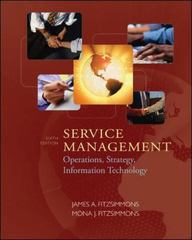Question
Hi Lecturer, Can help on this ? Thanks in advance PGBM156 STRATEGIC MANAGEMENT IN THE INTERNATIONAL CONTEXT TOPIC: Case Study: Reconciling Strategy Paradoxes in Turbulent
Hi Lecturer, Can help on this ? Thanks in advance
PGBM156 STRATEGIC MANAGEMENT IN THE INTERNATIONAL CONTEXT
TOPIC:Case Study: Reconciling Strategy Paradoxes in Turbulent Environments into IKEA
ASSESSMENT STRUCTURE
Executive Summary
1. Introduction
- Here you are required to briefly explain what this assessment is all about and what you will be addressing in this assessment.
- The students briefly explain their chosen IKEA and the details can be put under Appendix.
2. Managing the Demands for Localisation & Globalisation ent
2.1 Distinguish 'demand for localization and demand forglobalization' of a IKEA
2.2 Critically evaluate the potential impact of a possible post-Covid-19 era and the
strategic implications of the ongoing Russia-Ukraine War on your organisation's
approach to sustaining competitive advantage by applying Porter's generic
competitive strategy (Cost leadership, differentiation and focus
2.3 How the organisation manages the paradox of localisation and globalisation.
3. Building on Core Competences & Dynamic Capabilities
3.1 Distinguish between a firm's 'core competences'and 'dynamic capabilities'
3.2 Critically evaluate the benefits and limitations facing your organisation if it
deliberately adopts the 'organisational leadership perspective' and the
'organisational dynamics perspective' to achieve its corporate purpose
| Organisational leadership perspectives | Organisational dynamics perspectives | |
| Emphasis on | Control over chaos | Chaos over control |
| Organisational development | Controllable creation process | Uncontrollable evolutionary process |
| Development metaphor | The visible hand | The invisible hand |
| Development direction | Top-down, imposed organisation | Bottom-up, self-organisation |
| Decision making | Authoritarian (rule of few) | Authoritarian (rule of few) |
| Change process | Leaders shapes new behaviour | New behaviour emerges from interaction |
| Change determinants | Leaders' vision and skill | Political, cultural and learning dynamics |
| Organisational malleability | High and fast | Low and slow |
| Development driver | Organisation follows strategy | Strategy follows organisation |
| Normative implication | Strategize then organise | Organise then strategising |
3.3 By applyingthe paradox of profitability and social responsibility, critically evaluate the ability of the CEO/BoDs in your chosen organisation to simultaneously develop the competences and capabilities crucial for the organisation's survival and growth
3.4The challenges of reconciling the conflicting demands for profitability and social responsibility simultaneously in an international context.
4. Personal Reflections and Reflection on learning
- Lessons learned in doing the coursework.
- In this statement please write reflect on the impact of this assessment on your understanding of the nature of strategic management in international organisations. You are expected to use examples from your chosen organisation, which highlight the organisation's approaches to 'managing localisation and globalisation', 'building competences and capabilities', and 'managing profitability and social responsibility' with a view to survival and growth.
5. REFERENCES
- Minimum 15 references (use references from the year 2010-2022)
- Use Harvard referencing method
- Use in-text citations throughout your assessment.
- Font Size-12, Font type - TNR, 1.5 spacing.
- Use peer reviewed journal articles for example from Emerald, JStor, EbscoHost, Science Direct, Taylor Francis
Step by Step Solution
There are 3 Steps involved in it
Step: 1

Get Instant Access to Expert-Tailored Solutions
See step-by-step solutions with expert insights and AI powered tools for academic success
Step: 2

Step: 3

Ace Your Homework with AI
Get the answers you need in no time with our AI-driven, step-by-step assistance
Get Started


